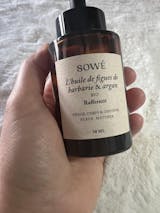To determine your skin type, follow these steps.
Prepare your skin
Start by removing your make-up completely and washing your face with a gentle cleanser. By the way, did you know that jojoba oil is a great 100% natural make-up remover that takes care of your skin at the same time? Next, wait an hour without applying any products to your skin.
Examine your skin
After an hour, dab your T-zone (forehead and nose) with a tissue. If sebum has been transferred to the tissue, your skin is either oily or combination. Also, find out how you feel. If your skin feels tight after washing, it's probably dry. If it feels refreshed, it's probably oily.
Don't hesitate to use our online diagnosis to find out which product is best for you.
Skin types
Here are the four different skin types:
Normal skin
It produces just the right amount of sebum to stay hydrated, protected and comfortable without shine.
Dry skin
It is desperately short of sebum, tight, uncomfortable and flaky.
Oily skin
It tends to be shiny all over the face. It is generally thicker, with dilated pores and irregular skin texture.
Mixed skin
It is often rather oily on the T-zone (where the sebaceous glands are most numerous) while the cheeks are dry and tight.
It is important to note that the condition of the skin can vary according to external factors such as climate, diet, stress, etc. It is therefore advisable to re-evaluate your skin type regularly to adapt your skincare routine. It is therefore advisable to regularly re-evaluate your skin type to adapt your skincare routine.






























































